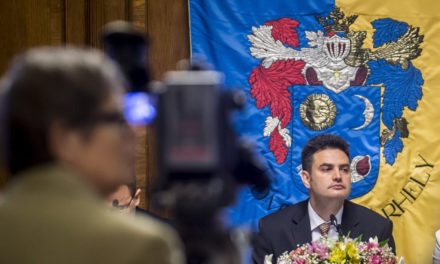Did they think that the very day after the elections I could punch my neighbor Józsi in the face and take his house with impunity? I think he stole it. And in the end, a few slaps and cleaning up Józsi as a family is still a milder measure than a constitutional coup.
Our opposition comrades have been telling us for months that breaking the law is not only desirable, but also necessary. So how does this message intimidate a few million voters? Who cares! If you don't like it, "shut up real quick", you'll get free beer and eternal life; larifári
Of course, if Józsi happens to be an enthusiastic DK voter, then he will appear in front of my house and kick in the door, then with his well-known intellect he will decide in two seconds whether to hang up or call IFÁ's Béci instead, but in the end, after a constitutional coup, why should he obey the laws? Or to me.
By the way, does anyone have any idea what will happen if they really violate the Constitution if they win?
I also don't know whether the independent-objective press workers artificially keeping the comrades alive have noticed that the worn-out faces they want to bring back to power in the name of renewal are actually not against Fidesz, not NER, but not yet also with the right-wing voting camp; they are at war with democracy. They want to amend legitimate, two-thirds laws with a half majority, which is impossible in a state of law; and period. There's nothing to argue about.
Of course, we understand and sympathize with the frustrated need to make iron rings out of wood, but this is an individual social problem; a private matter, not a public matter. Public affairs is the framework provided by the law, which protects us all, but also obliges us all. The Constitution is not a Santa Claus package, no one can eat the Milka chocolate from it and then throw away the virgács, just as we do not follow the rules of the KRESZ on the basis of sympathy; unless we want an intentional mass carnage.
Why do the comrades complain that Fidesz used its two-thirds mandate, if they are openly to abuse their hoped-for half majority? And why don't they think of the most obvious answer, which is legal and also gives them their own legitimacy: to obtain the two-thirds majority necessary for the desired constitution?
Of course, they know as well as we do: the memory of the communist decades before the system change and the post-communist decades that followed lives on in us, and the situation is that the memory of misery, humiliation and plunder is engraved in the souls of the vast majority of Hungarian society. And this memory is inherited, passed down from father to son, as if it were encoded in our genes. On our side, the beneficiaries of terror have always been in the minority, and arbitrariness remains arbitrariness even if the same people now call themselves democrats; there is still no real social majority behind them, at most hundreds of tricks.
Let's see how Dobrev feels about the constitutional coup in her 444 interview , of course without naming the child:
"Therefore, a new constitution will be needed, but this must be created with a wider consensus than two-thirds, with the involvement of the masses, and at the end authenticated by a referendum."
It is incomprehensible why Apró's grandson does not want to obtain this "wider than two-thirds consensus" right away in the elections, why in a subsequent referendum? Do you want to replace the people between the two acts?
"The essence of an election is that a nation gives a mandate to a political force to rule the country. This is even included in the Basic Law. Unconstitutional laws must be repealed, even with a simple majority, because they hinder the popular will."
The motto of "less is more" is not to be understood that way, unless you really want to believe that the majority of Fidesz voters did not represent the will of the people when they voted for Fidesz (three times in a row), but the minority voters of the opposition did. With that much power, he could have said that the vote of a Déka citizen is worth three times as much as that of a Fidesz citizen.
"In order for this to be the will of the majority, it is necessary to say very honestly at the elections what we are preparing for, as opposed to Fidesz, because they did not say that they were preparing for a constitution."
In other words, according to Dobrev, illegitimacy (constitutional coup) and the public preparation for it are fair, on the other hand, Fidesz's legal procedure – it did not promise a constitution without knowing the results – is unfair. We understand.
"There will be a huge difference between today's Basic Law and tomorrow's Constitution. The Basic Law was decided by one party, and neither the opposition nor the Hungarian population had an exchange of ideas about it."
As a matter of fact, he continued to do so cycle after cycle. That is precisely why the aforementioned "Hungarian population", of which the opposition is also a part, has repeatedly voted two-thirds of confidence in him. Furthermore, the situation is such that legitimacy is ensured only by the number of votes, and whether a single party receives them or not is indifferent. Cast on checkered paper: one hundred Dékás, one hundred Emeszpés, one hundred Momentos, one hundred Jobbikos and one hundred dialogue votes added together, it is a mathematical certainty that there are fewer than a thousand Fidesz votes.
"The only way to create a constitution in Hungary is if all Hungarians can participate, that's what the referendum is for."
Then again: if the opposition can only win an election with a half majority, why does it think that an overwhelming majority will legitimize its power in a subsequent referendum? How? Do you want to achieve this with a rifle or a blue tag? With population exchange? Maybe this is really the plan, after all, there will hardly be a shortage of immigrants who can be given the right to vote in the coming years.
As an echo of this, let's also look at what W. Árpád Tóta wrote in the columns of HVG:
"If the referendum includes accountability, and there are some sacrificial oxen prepared by then, they will go to the vote-out show. It feels good to be standing next to Columbo at the end. Watching the orbs collide and spread. To lick their tears and take possession of their stolen wealth. Eventually, the majority emerges, and with it the magic they call: legitimacy.”
What can be said to that?
If the comrades want Mordor, it can be Mordor, but then we will all live in Mordor. Even them.













